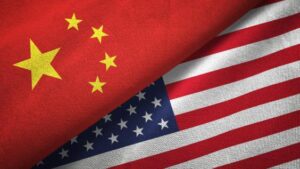3 Questions: U.S. – China Conflict – Impact of the Thucydides Trap on Third Countries
U.S. Secretary of State Antony Blinken met with Chinese President Xi Jinping and his counterpart, Chinese Foreign Minister Qin Gang, as part of his official visit to China on June 18. Blinken is the most senior American official to visit Beijing since President Biden took office in early 2021 over many disputes. It’s also the highest level visit from the U.S. side since 2018.
After U.S. Secretary of State Antony Blinken visited China, a second visit came from U.S. Treasury Secretary Janet Yellen before long, by July 6th. The visit, amid the escalating trade war between the U.S. and China, is expected to focus on easing relations between the world’s two largest economies. It shows that Washington seeks to maintain high-level contacts with Beijing. Janet Yellen says security should not derail U.S.-China economic relations. Although it gives hope of normalizing the relationship, it’s still far from reality.
- Why it matters to the world?
The United States and China are the first and second-largest economic powers in the world. Their role in R&D and production as well as global governance are essential factors in many senses. The current crisis and potential crisis affect the entire world.
Current disputes occur in cold conflict areas but the two countries also do have potential hot conflict areas. In this regard, when we filter U.S. Secretary of State Antony Blinken’s political part of his speech and focus on the data-based part, we can see some naked facts about the potential risk for both countries as well as to the rest of the world. For instance, “fifty percent of commercial container traffic goes through the Taiwan Strait every day. Seventy percent of semiconductors are manufactured in Taiwan. If as a result of a crisis that was taken offline, it would have dramatic consequences for virtually every country around the world”.

- What are the outcomes for the rest of the world?
During the meetings, the two sides mentioned their ‘red lines’ to each other. What’s more, two sides hold the talks from a global perspective. President Xi Jinping has said “planet Earth is big enough to accommodate the respective development and common prosperity of China and the U.S.” as well as the world needs a generally stable China – U.S. relationship. U.S. Secretary of State Antony John Blinken mentioned that “The United States and China have an obligation and responsibility to manage our relationship. The United States is committed to doing that. It’s in the interest of the United States, in the interests of China, and in the interest of the world.”
- What’s the current position on the U.S. – China conflict?
“When two elephants fight, it is the grass that is trampled.” Under current conflict third countries position their selves in different ways. At present, the rest of the world is not playing the role of the fixer but remains silent; following ‘wait and see’.
It’s a ‘win some, lose some’ dilemma. Some countries see those tension as an opportunity to expand their trade to gain more role in either U.S. or China’s supply chain system. Some even play a trade bridge role between two countries. Moreover, U.S. and Chinese companies replace their manufacturing places in the third countries which is a very positive development for some third countries.
This situation overall increased global trade of the countries’ with high level of international integration. For instance, China may import more agricultural products from Türkiye and China’s demand for technology products may become “introverted” and may want Korean companies to produce in China.
What’s more, U.S. and China in order to attract more foreign investors from third countries more willing to introduce their investment environment. This may be beneficial for foreign companies to invest and cooperate under smooth investment policies.
On the other hand, some other countries like Singapore which has a finance-oriented economy, have the U.S. as the largest investor and China as the biggest trading partner, which might indirectly hit the country by this conflict. Then again, although U.S. and Chinese producers are affected by the tariffs, those using the goods as intermediate inputs, are another potential losers.
Overall third countries may benefit or be hurt by the current conjuncture but many countries remain their balanced position. For instance, European Union (EU), EU is the largest economy in the world. EU’s attitude toward both rivals may tip the balance in favor of either the U.S. or China. The EU is the world’s largest trading bloc, safe under the defense umbrella of the U.S.-dominated NATO and trade agreements but at the same to would like to cherry-pick on the market and technological developments in China.
Due to less productive production and supply chain lines, the cost for the consumers becomes slightly high for now. Therefore, reshoring policies in China and the U.S. are not expected to have a high level of seizing short term. Because of this reason, U.S. Secretary of State Antony John Blinken’s visit to China is very significant to position mutual ties in a normalized or “arranged” platform to show a stable road map for both countries as well as to the rest of the world.

Lastly, one of the most recent and clear messages comes from Europe. During U.S. Secretary of State Antony John Blinken’s China visit, German President Frank-Walter Steinmeier hosts Chinese Premier Li Qiang in Berlin. According to German President Frank-Walter Steinmeier, U.S. – China relationship helps to ensure global security and co-operation. These words indirectly summarize the current situation.
The capital economy suffers in a fragmented world. As a concrete example, due to abstract pressure from both sides, some American brands which operate in the Chinese market are very careful in their every move. Some of those American brands have investors & operators in the Chinese market by third countries. Furthermore, sometimes those American brands takeovers by other countries. Currently, many companies which operate with both countries delay their business deals or investment plans.
Many capital holders still stick to “”laissez-faire, laissez-passer” but it seems very likely that following years, these two countries will reshape the global economic order in a way. Under current conjecture, countries with global value-added production will have a stronger position. Numerous countries have interests that are destined for conflicts, so U.S. and China. Globalization has lost its trend, new trend is encountering deglobalization. Nevertheless, those countries and the rest of the world need to avoid recession in 2023.
Questions are;
- Can we or should we bring re-globalization or focus on glocalization?
- Is this new economic trend good for the third countries?
Thucydides Trap: Thucydides is the person who wrote the History of the Peloponnesian War. The term refers to the dilemma between a Hegemonic power and a rising power that threatens this hegemony, with reference to the Peloponnesian War between Sparta and Athens; explains the tendency towards war between countries.
Ahmet Faruk ISIK, Business Council Coordinator, Foreign Economic Relations Board of Türkiye (DEIK), Ph.D. Candidate at comparative politics and area studies, Shanghai International Studies University and research assistant of Shanghai Academy of Global Governance and Area Studies (SAGGAS).



